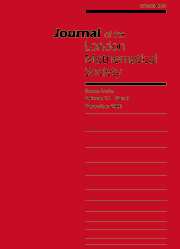Crossref Citations
This article has been cited by the following publications. This list is generated based on data provided by
Crossref.
Downey, Rod
Li, Angsheng
and
Wu, Guohua
2004.
Complementing cappable degrees in the difference hierarchy.
Annals of Pure and Applied Logic,
Vol. 125,
Issue. 1-3,
p.
101.
Li, Angsheng
2005.
New Computational Paradigms.
Vol. 3526,
Issue. ,
p.
287.
Арсланов, Марат Мирзаевич
and
Arslanov, Marat Mirzaevich
2011.
Теоретико-модельные свойства тьюринговых степеней разностной иерархии Ершова.
Современные проблемы математики,
Vol. 15,
Issue. ,
p.
5.
Arslanov, M. M.
2012.
Model-theoretic properties of the n-c.e. degrees.
Journal of Logic and Computation,
Vol. 22,
Issue. 4,
p.
669.
Arslanov, M. M.
2012.
Model-theoretic properties of turing degrees in the Ershov difference hierarchy.
Proceedings of the Steklov Institute of Mathematics,
Vol. 278,
Issue. S1,
p.
57.
ARSLANOV, MARAT
2018.
Splitting and non-splitting in the difference hierarchy.
Mathematical Structures in Computer Science,
Vol. 28,
Issue. 3,
p.
384.
Arslanov, M. M.
and
Yamaleev, M. M.
2018.
On the Problem of Definability of the Computably Enumerable Degrees in the Difference Hierarchy.
Lobachevskii Journal of Mathematics,
Vol. 39,
Issue. 5,
p.
634.
Elwes, Richard
Lewis-Pye, Andy
Löwe, Benedikt
Macpherson, Dugald
Normann, Dag
Sorbi, Andrea
Soskova, Alexandra A.
Soskova, Mariya I.
van Emde Boas, Peter
Wainer, Stan
and
Löwe, Benedikt
2018.
S. Barry Cooper (1943–2015).
Computability,
Vol. 7,
Issue. 2-3,
p.
103.
Yamaleev, M. M.
2020.
Isolation from Side in 2-Computably Enumerable Degrees.
Russian Mathematics,
Vol. 64,
Issue. 8,
p.
70.
Arslanov, M. M.
and
Yamaleev, M. M.
2021.
Turing Computability: Structural Theory.
Journal of Mathematical Sciences,
Vol. 256,
Issue. 1,
p.
1.
Yamaleev, M. M.
2023.
Isolation from Side and Cone Avoidance in the 2-Computably Enumerable wtt-Degrees.
Journal of Mathematical Sciences,
Vol. 275,
Issue. 1,
p.
54.
Bagaviev, R. R.
2024.
Special Splitting in the 2-c.e. Turing Degrees.
Lobachevskii Journal of Mathematics,
Vol. 45,
Issue. 4,
p.
1782.


